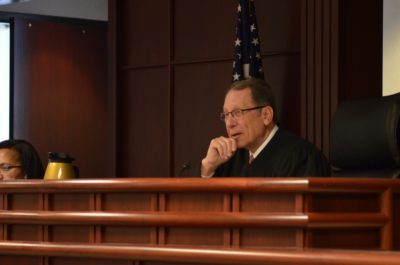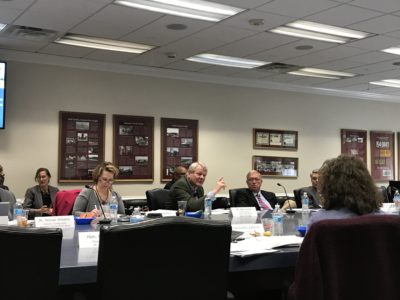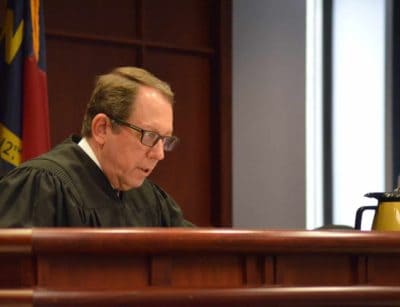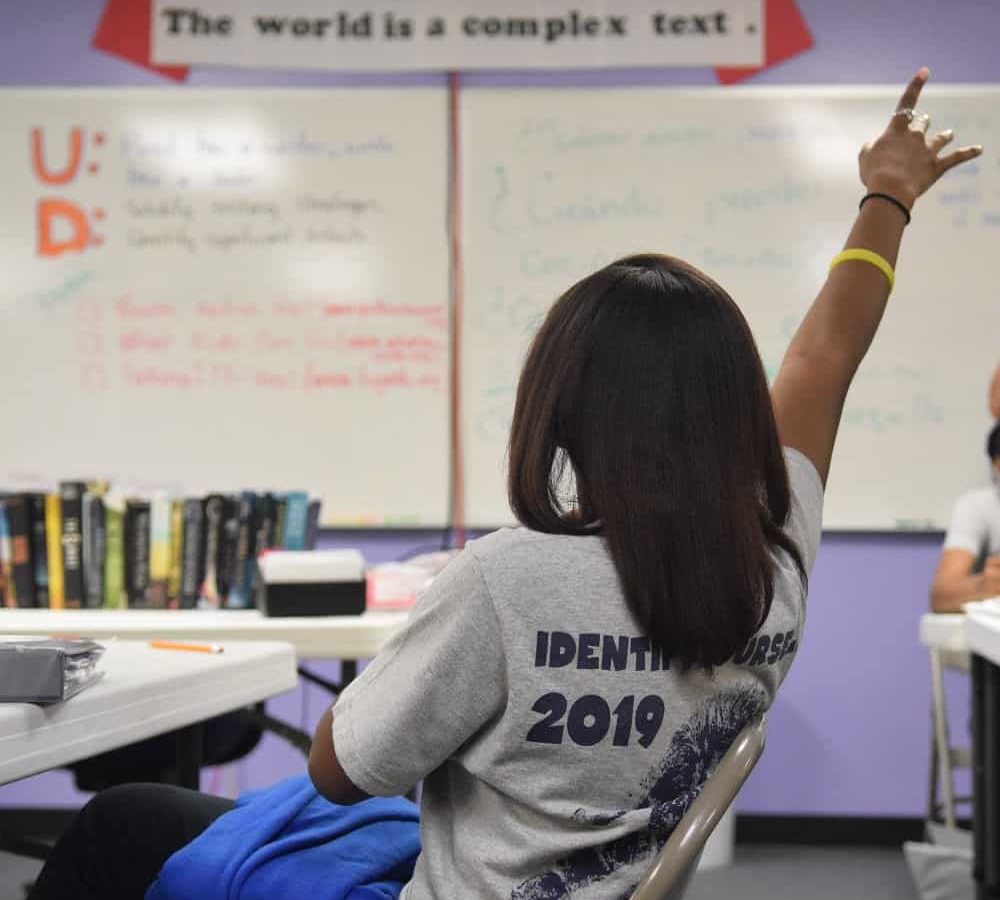
Editor’s Note: This resource was updated by the author on Feb. 15, 2024.
This North Carolina court case began in 1994, and it defines the state constitutional right for students to a sound, basic education and the state’s obligations to remedy constitutional violations. It is generally referred to as the Leandro litigation, named after one of the original plaintiffs from Hoke County. The North Carolina Supreme Court has issued four opinions so far in this case and another is anticipated in 2024. Particular Supreme Court opinions are referred to as either Leandro v. State or Hoke County Bd. of Educ. v. State along with the number of the opinion. For additional clarity, the year is also shown below.
Full name: Hoke County Board of Education, Plaintiffs and Charlotte-Mecklenburg Board of Education, Plaintiff-Intervenor and Rafael Penn, et al., Plaintiff Intervenors, v. The State of North Carolina, Defendant, and State Board of Education, Defendant, and Charlotte-Mecklenburg Board of Education, Realigned Defendant, and Philip E. Berger, in his official capacity as President Pro Tempore of the North Carolina Senate, and Timothy K. Moore, in his official capacity as Speaker of the North Carolina House of Representatives, Defendant-Intervenors
Court assigned case numbers: Wake County 95 CVS 1158; N.C. Court of Appeals 95-321 (1996), 11-1545 (2012 — opinion vacated by the N.C. Supreme Court); N.C. Supreme Court 179PA96 (1997); 530PA02 (2004); 5PA12-2 (2013); 425A21-2 (2022); 425A21-3 (2024). Separate litigation regarding the state controller’s petition is 425A21-1.
Constitutional provisions: N.C. Constitution, Article I, § 15; N.C. Constitution, Article IX, §2.
![]() Sign up for the EdWeekly, a Friday roundup of the most important education news of the week.
Sign up for the EdWeekly, a Friday roundup of the most important education news of the week.
Status of the parties
Plaintiff parties: The plaintiff school districts remain as they have since the beginning of the case: Hoke County Schools, Halifax County Schools, Robeson County Schools, Cumberland County Schools, and Vance County Schools. The names of students and guardians have changed over time as students matriculated through the education system.
Rafael Penn et al., Plaintiff-Intervenors: The Penn Intervenors joined the lawsuit in 2005 with claims against the State and Charlotte Mecklenburg Schools for failure to provide a sound basic education in central city and high poverty schools in CMS. The Penn Intervenors remain in the case, although names of individual students and guardians have changed.
Plaintiff Intervenors/Realigned Defendant: The one remaining plaintiff intervenor among school districts is Charlotte Mecklenburg Board of Education. It also is a “realigned defendant.” Along with a group of more resourced, urban districts (see below for the list), it intervened in the case originally to make sure that the constitutional right to education and deficiencies in the state system in their districts also were addressed. Other plaintiff intervenors have withdrawn from the case; however, Judge Manning did not allow the Charlotte Mecklenburg Board to withdraw as it also was a “realigned defendant” in regard to the Penn Plaintiff Intervenors. As a realigned defendant, Mecklenburg County Board of Education sought dismissal on Dec. 19, 2019, of the intervening claim by the Penn Intervenors. This motion to dismiss remains with the court.
State: Since the beginning of the legislation, the “State” was named as a defendant. The courts interpreted this to mean the executive and legislative branches. In 2018, the executive branch stepped in to work with the Plaintiffs towards a comprehensive remedial plan. After Senate President Phil Berger and House Speaker Timothy Moore intervened to represent the interests of the North Carolina General Assembly in 2021, the Attorney General has represented the executive branch and related administrative agencies in the litigation.
State Board of Education: The court dismissed the State Board’s motion to be released from the remedial jurisdiction of the court in July of 2017. On March 13, 2018, Judge Lee denied the defendant State Board of Education’s motion. The court made conclusions of law, including that neither the State Board nor State had met their burden of demonstrating substantial compliance with Leandro directives and that the State Board had a significant, non-delegable role in affording the constitutional entitlements.
Legislative Defendant-Intervenors: The Senate President Phil Berger and House Speaker Timothy Moore intervened on behalf of the General Assembly in 2021 to appeal the November 10 trial court order. They participated in the oral arguments and appeal leading to the Leandro IV decision and appealed the April 26 trial court order, leading to the upcoming Leandro V arguments. They also unsuccessfully sought to intervene in the related litigation initiated by the state controller when the state controller petitioned the Supreme Court in 2023 in regard to the trial court directive to transfer funds.
Beginning of the case
In 1994, five poor school systems sued the State, seeking both a declaration that the State had failed to meet its constitutional duties to provide equal educational opportunities for all students and a court-imposed remedy to correct the violation. These school boards for systems in Cumberland, Halifax, Hoke, Robeson, and Vance counties were joined by individual plaintiffs, including Kathleen M. Leandro and her son, Robert A. Leandro, a student in the Hoke County Schools — the first named plaintiffs in the lawsuit.
Another group intervened in the lawsuit to assert the failure of the state under the current school funding system to provide adequate educational opportunities to students in relatively large and wealthier systems in the state — boards of educations and students and their parents or guardians from school systems of the City of Asheville and of Buncombe, Wake, Winston-Salem/Forsyth, Charlotte-Mecklenburg, and Durham counties.
In 1996, the Court of Appeals rejected claims by the plaintiffs and plaintiff-intervenors.
More K-12 news

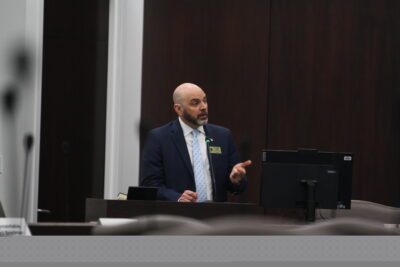

Chronology of litigation
Leandro I (1997)
In 1997, the Supreme Court reversed the Court of Appeals in a unanimous opinion authored by Justice Burley Mitchell, stating, “[w]e conclude that Article I, Section 15 and Article IX, Section 2 of the North Carolina Constitution combine to guarantee every child of this state an opportunity to receive a sound basic education in our public schools.” The Supreme Court agreed with the Court of Appeals in rejecting the plaintiffs’ claim for substantial funding equality, with a dissent from Justice Robert Orr.
The Supreme Court remanded the case to the trial court. Superior Court Judge Howard E. Manning, Jr. presided over a lengthy hearing process and issued four memoranda of decisions from October 2000 through May 2001, concluding that the State had failed to provide at-risk students with the opportunity to obtain a sound basic education and ordering a remedy of providing pre-kindergarten to at-risk students. The focus of the finding of the constitutional violation was in Hoke County Schools. The State appealed and the Supreme Court agreed to hear the appeal directly.
Leandro II (2004)
In 2004, the Supreme Court, in a unanimous opinion authored by Justice Robert Orr, affirmed the trial court’s order finding the state had violated the constitution based on the record, particularly in regard to at-risk students in Hoke County. The Court reversed the trial court in regard to its pre-kindergarten order, finding that the State should have been given the opportunity to propose a constitutional remedy before it was imposed by the court.
On remand, the trial court proceeded to hold numerous hearings and issue reports, orders, and other memoranda including on performance problems in high schools — including Charlotte Mecklenburg Schools — and in early grade reading, and numerous issues in Halifax County Schools. All of the relatively larger and wealthier school districts that had intervened voluntarily dismissed their claims in 2006, except Charlotte Mecklenburg Board of Education, which could not do so as it also was named as a defendant by an additional set of plaintiff-intervenors (the “Penn” intervenors).
Leandro III (2013)
As required, the State continued to provide to the trial court its efforts to expand availability of pre-kindergarten. After the General Assembly modified the program in ways that would limit access to the pre-kindergarten program in 2011, Judge Manning ordered the State not to implement any law or regulation that would deny eligible at-risk children admission to the pre-kindergarten program and to “provide the quality services of the NCPK to any eligible at risk four year old that applies.” The State appealed the order. In 2012, the General Assembly substantially amended the legislation and the provisions that limited access. The Court of Appeals affirmed Judge Manning’s order in 2012, including the mandate to not deny any eligible “at-risk” four-year-old admission to the pre-kindergarten program. On appeal by the State, the Supreme Court in 2013 reversed. In a per curiam opinion (issued in the name of the court rather than authored or signed by individual justices) the Supreme Court held that the changes to the legislation by the General Assembly in 2012 made the controversy moot. The Supreme Court vacated the opinion of the Court of Appeals and remanded the case to the Court of Appeals with instructions to vacate the order of the trial court.
Comprehensive Remedial Plan
Judge Manning held hearings on April 8-9, 2015, and ordered the State to provide a “definite plan of action” to comply with constitutional mandates. The State Board of Education submitted a plan on July 1, 2015, and Judge Manning held hearings in regard to this plan. The Plaintiffs disputed the adequacy of this plan.
Judge Manning reached the mandatory retirement age just after the hearing. Before beginning retirement, he issued the order for a hearing in November with the intent to return to the bench in a special status available to retired judges. There was, instead, a delay and shift in plans when health concerns prevented Judge Manning from returning during retirement. On October 7, 2016, Chief Justice Mark Martin reassigned Leandro to Judge W. David Lee.
Meanwhile, the governor established the Governor’s Commission on Access to Sound Basic Education on July 21, 2017 (Executive Order 10) and revised it on Nov. 15, 2017 (Executive Order 27). This commission would focus on the three pillars of Leandro — qualified principals, qualified teachers, and adequate resources — and would work in conjunction with an independent consultant.
On Feb. 1, 2018, Judge Lee responded to a joint motion by the State defendant and plaintiff parties for case management and the scheduling order, setting in motion the selection and approval of an independent consultant that would provide “detailed, comprehensive, written recommendations for specific actions necessary to achieve sustained compliance with the constitutional mandates.” And on March 7, 2018, (filed March 13, 2018) Judge Lee appointed WestED to serve as the independent consultant based upon the joint recommendation of the State defendant and Plaintiff parties. The State Board of Education was not a part of the joint motion. The “WestEd Report,” which provided a comprehensive report to the court with research and recommendations, was released on Dec. 10, 2019 (see below for additional links).
On Jan. 21, 2020, Judge Lee issued findings of fact, conclusions of law, and orders for next steps. Citing heavily from the WestEd report, the court found substantial evidence that despite numerous State initiatives, many children were not receiving a sound, basic education. The court held that it is the “State’s duty to implement the fiscal, programmatic and strategic steps necessary to ensure these seven components are in place and, ultimately, to achieve the outcomes for students required by the Constitution.” All parties agreed to the findings of fact and conclusions of law included in the opinion.
Following the WestEd report, the court expected a remedial state plan to address seven elements (see the report for fuller description):
- A system of teacher development and recruitment;
- A system of principal development and recruitment;
- A finance system that provides adequate, equitable, and predictable funding;
- An assessment and accountability system that reliably assess multiple measures of student performance against the Leandro standard;
- An assistance and turnaround function that provides necessary support to low-performing schools and districts;
- A system of early education that provides access to high-quality pre-kindergarten and other early childhood learning opportunities; and
- An alignment of high school to postsecondary and career expectations, as well as the provision of early postsecondary and workforce learning opportunities.
In March 2021, the Plaintiffs and State submitted a comprehensive eight-year plan to the court, building off of the work of the WestEd report as well as recommendations from the Commission on Access to Sound Basic Education. Through this work, the executive branch of the State participated in the process. In June 2021, Judge Lee signed an order that the state must implement this Comprehensive Remedial Plan (CRP). In a September 2021 hearing, Judge Lee set an Oct. 18 date by which the state must have secured the funds needed to implement the CRP. When this was not met, at a hearing on Oct. 18, the judge gave the plaintiffs and defendants in the case until Nov. 8 to give him suggestions on how to hold lawmakers accountable for the CRP funding.
![]() Sign up for the EdDaily to start each weekday with the top education news.
Sign up for the EdDaily to start each weekday with the top education news.
Trial Court Order, Nov. 10, 2021
On Nov. 10, 2021, Judge Lee ordered the state to transfer $1,753,153,000 from the state’s general fund to pay for years two and three of the CRP. The State appealed. The Defendant-Intervenors also entered the lawsuit and appealed the court order.
Court of Appeals Writ of Prohibition
On Nov. 24, State Controller Linda Combs petitioned the Court of Appeals to prohibit the trial court’s directive for the transfer of surplus funds to make up the deficit between the funding required by the CRP and the amount included in the state budget. On Nov. 30, a three-judge panel voted 2-1 to order a “Writ of Prohibition.”
Trial Court Order, April 26, 2022
The parties appealed the trial court order and the Court of Appeals’ Writ of Prohibition. In accepting the case, the Supreme Court remanded it to the trial court to determine the impact of the 2021 state budget on the amount that would need to be transferred. Now in front of Judge Michael Robinson, the court calculated the amount required for the transfer to be $785,106, 248. The order did not include a directive for transfer, given the Court of Appeals Writ.
Leandro IV (2022)
The case went back before the Supreme Court on Aug. 31, 2022 for oral arguments. The Supreme Court asked parties to respond to two questions:
- Whether any judge in this case has found a statewide violation of students’ constitutional right to access a sound, basic education; and
- Whether the courts can compel the transfer of $785 million to state agencies as remedy for any violation.
Along with the parties long-established in the litigation, the Defendant-Intervenors and state controller made arguments to the Supreme Court.
On Nov. 4, in an extensive opinion written by Justice Robin Hudson, the 4-3 court majority held that the Leandro litigation did include findings of statewide violations that would therefore justify a statewide remedial plan. The court also reinstated the trial court’s directive for the transfer of state funds, determining that it was within the trial court’s authority. The Supreme Court remanded the case to the trial court to once again adjust the amount needed for the transfer based on the latest state budget and to include the directive for transfer in its order. The Supreme Court also ordered the trial court to maintain jurisdiction over the case. Justice Phil Berger, Jr. wrote the dissent that was joined by Chief Justice Paul Newby and Justice Tamara Barringer.
Supreme Court Order, November 2022 (consolidation of 425A21-1 and 425A21-2)
On the same day as the Leandro IV opinion, the Supreme Court issued an order to clarify the nature of the consolidation of the state controller litigation (docket 425A21-1) with the Leandro litigation (docket 425A21-2). The order stated in part, “we hereby stay the Writ of Prohibition pending any further filings in 425A21-1 pertaining to issues not already addressed in the opinion filed on this day in 425A21-2.”
Supreme Court Order, March 3, 2023 (docket 425A21-1)
When Linda Combs retired from her position as state controller on June 30, 2022, Democrat Gov. Roy Cooper appointed Nels Roseland to fill the position. Requiring confirmation from the General Assembly, Roseland did not receive it in 2022; however, he began as acting controller on July 1, 2022, and took Combs’ place in the Leandro litigation for the oral arguments in August 2022. The General Assembly took up Roseland’s confirmation when it began its new session in 2023. On the day that his confirmation cleared the General Assembly, he appealed to the Supreme Court to reinstate the Writ of Prohibition. The same day, Feb. 8, 2023, the Defendant Intervenors also appealed to the Supreme Court on this matter and to raise numerous other questions regarding Leandro citing the language in the November 2024 order of “issues not already addressed.”
At the beginning of 2023, the Supreme Court was newly comprised after the elections with a 5-2 Republican majority. Along party lines, the Supreme Court issued this order, agreeing with the controller’s petition and removed its stay on the Writ of Prohibition, thus prohibiting the trial court from directing the transfer of funds. The Supreme Court dismissed the filings of the Defendant Intervenors for failing to properly intervene in this separate litigation.
Trial Court Order, April 17, 2023
After holding hearings and reviewing evidence presented by the parties, Judge James Floyd Ammons, Jr. — newly assigned to the case to replace Judge Robinson — held that the new calculation of the amount needed to fund years two and three of the CRP, in addition to the amount included in the 2022 budget was $677,801,707. Given the March 2023 Supreme Court order, Judge Ammons did not include the transfer directive.
Leandro V Oral Arguments
The Defendant Intervenors appealed the April 2023 trial court decision on various grounds. The Supreme Court accepted the appeal on discretionary review, with Justices Earl and Riggs dissenting. The Supreme Court accepted the appeal “solely on the question of whether the trial court lacked subject matter jurisdiction to enter its order of 17 April 2023.” Oral arguments are calendared for Feb. 22, 2024.
Additional resources
Sound Basic Education for All: An Action Plan for North Carolina (WestEd Report)
Executive Summary of WestEd’s Report
WestEd’s supporting reports:
- Statewide assessment system
- Statewide accountability system
- Cost adequacy, distribution, and alignment of funding
- Supporting student learning by mitigating student hunger
- High-poverty schools: Assessing needs and opportunities
- School success factors
- Attracting, preparing, supporting, and retaining educational leaders
- Educator supply, demand, and quality
- Developing and supporting teachers
- Best practices to recruit and retain well-prepared teachers
- Retaining and extending the reach of excellent educators
- How teaching and learning conditions affect teacher retention and school performance
Supplement to the Investment Overview and Sequenced Action Plan in the WestEd Report
Recommended reading
